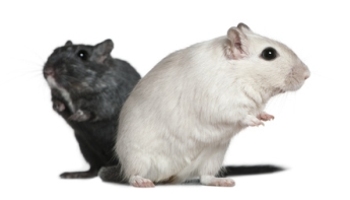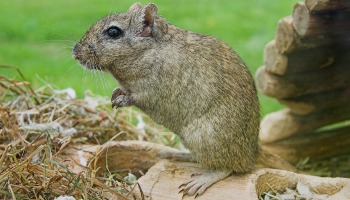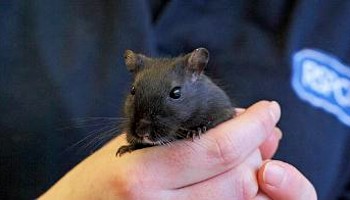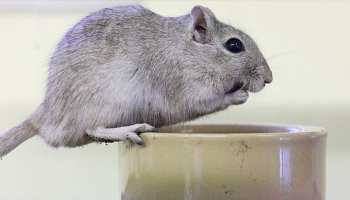Gerbils
Thinking about getting a gerbil or two? Gerbils make rewarding pets, but they need to be looked after carefully to keep them healthy and happy.
There are many species of gerbils, though the Mongolian gerbil (Meriones unguiculatus) is the species of gerbil most commonly kept as a pet. Their scientific name translates as ‘little clawed warrior’ and they are also referred to as ‘jirds’. They belong to the family of the Cricetidae (burrowing rodents) and are naturally adapted to desert environments in Africa, India and Asia.

Gerbil fact file
Gerbils are generally diurnal animals, which means they're out and about during the day. They construct deep, dark, underground burrows. Here are some top gerbil facts:
- Gerbils can live for up to three to four years – some even longer.
- Gerbils are generally diurnal animals, which means they're out and about during the day. They construct deep, dark, underground burrows.
- Gerbils are burrowing rodents and are naturally adapted to desert environments in Africa, India and Asia. They keep themselves busy by digging and their burrowing behaviour makes them fascinating to watch.
- Gerbils are very agile, but they can’t climb well due to fur covering the soles of their feet!
- Gerbils like to gnaw, which helps to keep their teeth short – they never stop growing! In the wild, a gerbil will gnaw off all of the needles of a pine tree before shredding the branch itself. They also shred material to use in nesting.
- Gerbils are sociable – in the wild, they live in extended families of one breeding pair and several generations of its offspring. Usually, only the dominant pair reproduces. Offspring then help at the nest, learning essential parenting skills themselves. Group sizes can be between two and 17 animals!
- Gerbils learn a lot from their parents, for example, favoured foods are learnt from their mothers or from other familiar or related family members.
- Gerbils need their fathers. The males help raise the young by collecting nesting material, helping to build the nest, and to clean the pups. This ensures the pups are always supervised and increases pup activity. Pups with their fathers present also open their eyes earlier.
- Gerbils live in burrows. In the wild, gerbil burrows contain tunnels and food and nest chambers. They can be as deep as 1.7m underground and may extend horizontally over 6m–8m.
- Although gerbils don’t have cheek pouches like hamsters, they exhibit hoarding behaviour.
- Gerbils have long legs! Their hind legs are relatively long in comparison to their forelegs, and they use their hind legs extensively during digging and to perform rapid foot-thumping to raise alarm. Male gerbils also foot-thump after mating.
- Gerbils use a range of methods to communicate. As well as sensitive hearing, gerbils have an excellent sense of smell – they scent-mark their territory using a gland on their abdomen, and females also scent-mark their pups which is thought to help them recognise their offspring (although females generally scent-mark less than males).
- Because they are naturally adapted to dry climates, gerbils excrete relatively small amounts of urine to retain body fluid in the wild.
-
Gerbils have a wide variety of coat colours, including black, spotted and the more common agouti colouring. There are behavioural and physical differences between the black and agouti. For example, black gerbils scent-mark more than agouti gerbils, believed to be due to hormonal and neural differences. Females may also prefer males of their own fur colour.
Understanding your gerbil's needs
Gerbils are characterful animals, and that's why they're often kept as pets. However, their needs are actually very complex, so owning one is a big responsibility. They can be easily injured as a result of rough or careless handling. If you own or are responsible for gerbils, even for a short time, make sure you care for all their needs.
Find out everything you need to know about keeping pet gerbils in our series of handy guides, including their:



